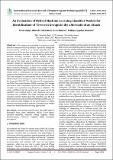An Evaluation of Hybrid Machine Learning Classifier Models for Identification of Terrorist Groups in the aftermath of an Attack
Publication Date
2019Author
Peter Opiyo Oketch, Muhambe Titus Mukisa, Makiya Cyprian Ratemo
Metadata
Show full item recordAbstract/
The urgency of responding to a terrorist attack
and the subsequent nature of analysis required to identify the
terrorist group involved in an attack demands that the
performance of the machine learning classifiers yield highly
accurate outcomes. In order to improve the performance of
machine learning classifiers, hybrid machine learning
algorithms are used with the goal of improving the accuracy.
The aim of the study was to build and evaluate hybrid
classifier models for identification of terrorist groups. The
research specifically sought to: build base classifiers (Naïve
Bayes, K-Nearest Neighbor, Decision Trees, Support Vector
Machines and Multi-Layer Perceptron); build hybrid classifier
models from a combination of the base classifiers; and
compare the performance of the hybrid and base classifiers.
The study adopted an experimental research method using
WEKA tool for data mining and real-world terrorist datasets
for the period 1999-2017 for Sub-Saharan Africa region from
the Global Terrorism Database. WEKA supervised filter Ranker
was used to select 6 attributes of data and 784 records. The
classifiers were evaluated using 10-fold cross validation. The
study established that the optimal performance for all the
classifiers was realized with a more balanced class at a
resample rate of 1000%. The study concludes that hybrid
classifiers perform better than base classifiers, and the best
performing model was a hybrid combination of KNN, and DT.
The study provides insights on the performance of hybrid
machine learning classifiers and lays a foundation for further
research in hybrid machine learning approaches.

